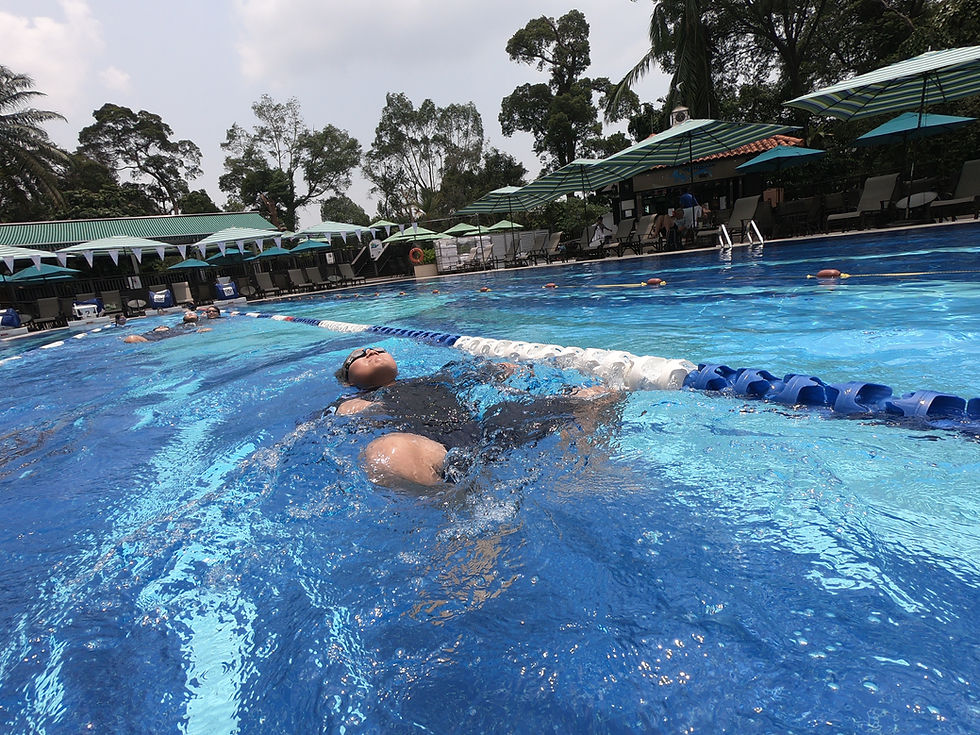The Dangers of Swimming Alone: Why You Should Always Have a Buddy
- SG Sink Or Swim

- Dec 19, 2024
- 4 min read

Swimming is a refreshing activity that promotes fitness, relaxation, and enjoyment. However, as enjoyable as swimming may be, it comes with inherent risks that can become life-threatening without proper precautions. One of the most important safety measures is never swimming alone. Regardless of your skill level, having a buddy when you swim can mean the difference between a safe experience and a potential tragedy.
In this post, we’ll explore the dangers of swimming alone, the benefits of having a swim buddy, and practical tips to stay safe in the water.
Why Swimming Alone is Dangerous
Risk of Drowning
Even experienced swimmers can face emergencies such as cramps, exhaustion, or sudden health issues like a heart attack.
Without someone nearby, a minor incident can escalate into a life-threatening situation.
Unpredictable Water Conditions
In open water, currents, tides, or unexpected weather changes can create hazardous situations.
Pools may also pose risks such as slippery surfaces, deep water zones, or malfunctioning equipment.
Medical Emergencies
Seizures, fainting, or other medical conditions can occur unexpectedly.
Without a buddy, there’s no one to call for help or provide immediate assistance.
Wildlife Encounters
In open water, swimmers may encounter dangerous marine life such as jellyfish, sharks, or stinging fish.
Having a buddy ensures someone is there to provide aid or get help if needed.
Overestimating Your Abilities
Swimming alone often leads to overconfidence, pushing limits without realizing the risks.
A buddy can help keep your pace realistic and ensure you don’t take unnecessary risks.
The Benefits of Having a Swim Buddy
Immediate Assistance in Emergencies
A buddy can perform lifesaving actions like throwing a floatation device, calling for help, or performing CPR.
Enhanced Enjoyment
Swimming with someone makes the experience more enjoyable, whether you’re training, exploring, or relaxing.
Accountability and Motivation
A swim buddy can help you stay on track with your fitness goals and push you to perform better.
Improved Awareness
Two sets of eyes are better than one for spotting potential hazards, like strong currents or dangerous wildlife.
Shared Responsibility
A buddy system creates a mutual sense of responsibility for each other’s safety, ensuring precautions are taken seriously.
Who Can Be Your Swim Buddy?
Friends or Family:
A close friend or family member who enjoys swimming is often the easiest and most trusted choice.
Training Partners:
For competitive or fitness swimmers, a training partner can double as a safety buddy.
Lifeguards:
In public pools or beaches, lifeguards act as a safety net, but they shouldn’t replace having your own buddy.
Swim Groups or Clubs:
Joining a swimming group ensures you’re always surrounded by others while swimming.
Technology-Assisted Buddies:
While not a substitute for a person, safety devices like swim monitors or GPS trackers can alert others in case of emergencies.
Practical Tips for Safe Swimming
1. Always Plan Ahead
Inform someone about your swimming plans, including location and duration.
Check weather conditions and water temperature, especially for open water swims.
2. Use Floatation Devices
Wear a swim buoy in open water for visibility and added safety.
Keep life vests or floatation aids nearby, even in pools.
3. Communicate Signals
Agree on hand signals or vocal cues with your buddy to indicate if you need help.
Establish a system for periodic check-ins during longer swims.
4. Avoid Alcohol or Drugs
Never swim under the influence of alcohol or drugs, which impair judgment and coordination.
5. Know Your Limits
Avoid swimming in areas beyond your skill level, such as rough waters or strong currents.
Stay close to shore in open water unless you’re with a group and have safety equipment.
6. Stay Visible
Wear brightly colored swim caps or suits to increase visibility in the water.
Use lights or reflective gear for night or early-morning swims.
Real-Life Stories Highlighting the Risks of Swimming Alone
A Close Call in Open Water:
A triathlete swimming solo in a lake suffered a cramp halfway through her session. Struggling to stay afloat, she was rescued by a nearby kayaker.
Lesson: Always have someone nearby, even if you’re an experienced swimmer.
A Medical Emergency at the Pool:
A competitive swimmer experienced a sudden seizure while swimming laps alone. Fortunately, a lifeguard noticed and provided immediate aid.
Lesson: Swimming alone can delay help in emergencies. Always ensure someone is watching.
Overestimating Ability in the Ocean:
A vacationer ignored warnings about rip currents and ventured out alone. Unable to swim back, he was saved by a beachgoer.
Lesson: The ocean is unpredictable—having a buddy or lifeguard presence is critical.
Swimming Alone Safely: Exceptions and Precautions
While it’s always safer to swim with a buddy, there may be times when swimming alone is unavoidable. In such cases, take extra precautions:
Swim in Supervised Areas: Always choose locations with lifeguards on duty.
Carry Safety Gear: Use swim buoys, whistles, and waterproof safety devices.
Set a Timer: Inform someone when you start swimming and schedule a check-in time.
Stay Close to Shore: Avoid venturing far from safety points.
Conclusion
Swimming alone might seem peaceful or convenient, but it comes with significant risks that no swimmer should ignore. Regardless of your skill level, always prioritize safety by swimming with a buddy or in supervised areas. Having a swim buddy isn’t just about safety—it enhances your swimming experience, keeps you motivated, and provides peace of mind for you and your loved ones.
Remember: no swim is worth risking your life. Be safe, and always swim smart!





Comments